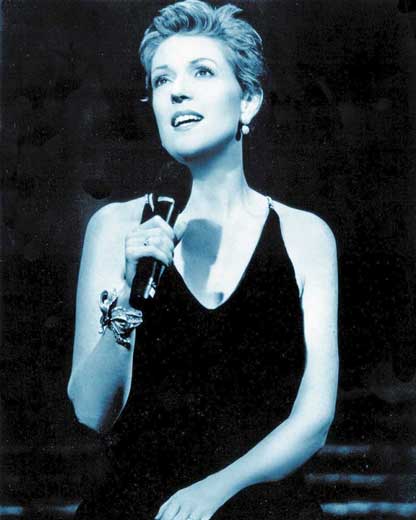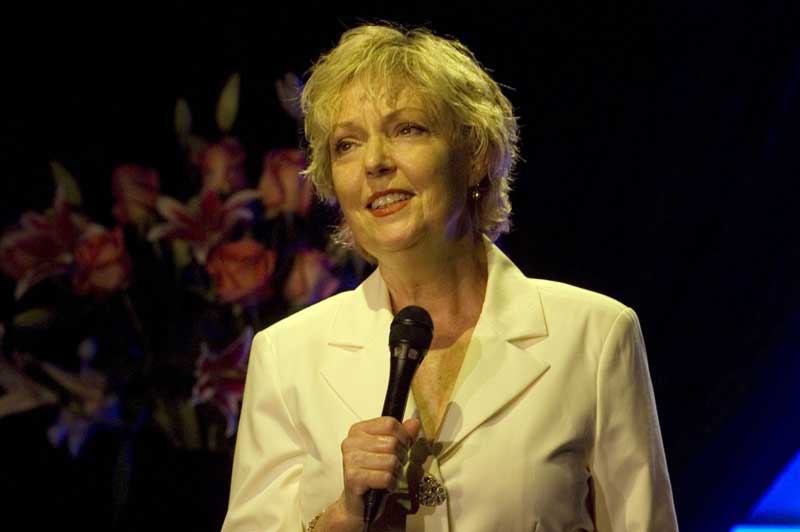Mary Cleere Haran: ‘Elegant, urbane, a little naughty.’When The Moon Was Blue
Mary Cleere Haran
May 13, 1952-February 5, 2011
By David McGee
Mary Cleere Haran, an exalted practitioner of the Great American Songbook, whose exquisite voice graced many a classic pop tune but especially favored and ennobled those of Lorenz Hart, died on February 5 in Deerfield Beach, FL. Two days earlier she had been struck by a car while bicycling and never regained consciousness.
Ms. Haran emerged at the end of the golden age of cabaret in New York City, fittingly at one of the era’s foremost establishments, The Ballroom. She made an immediate impact as a classy, inventive stylist and a classy woman to boot, one who seemed thoroughly of her time in attitude but projected the style and sophistication of a more elegant time in American life.
“Haran epitomizes an idea of glamour that’s the quintessence of New York,” opined Charles Isherwood in Variety, “ or at least of the imaginary one of yore: elegant, urbane, a little naughty.”
A tribute to Mary Cleere Haran posted on YouTube by guyhalliday http://www.youtube.com/user/guyhallidayOften favorably compared to Ella Fitzgerald, Haran evinced little flair for jazz; instead, hers was a style rooted more in a time when pop and jazz vocalizing were closely aligned. Indeed, rather than Ms. Fitzgerald, the better model for Ms. Haran’s approach was Peggy Lee. Like Ms. Lee, Ms. Haran was a subtle, adventurous singer (and, when she wanted to be, a sultry one, too), but also an actress and writer. It should be added she was also a champion Irish step dancer, an art she took up as a girl growing up in San Francisco (where she was born, on May 13, 1952, the second of eight children in an Irish Catholic family, daughter of a professor of theater and film at San Francisco City College), at the encouragement of her Irish mother. It was the dancing, in fact, that led her into singing, as she revealed in an interview with the Sacramento Bee in 2008.
“I wanted to be able to work with the upper half of my body as well,” she said, “so I left dancing and took up the violin. I couldn’t master it, so I started to sing the notes and discovered I had a good voice.”
Given the time of her youth—at the apex of the hippie scene centered on her home town’s Haight-Ashbury district—it’s a wonder Ms. Haran didn’t gravitate to the city’s flourishing rock scene. Instead, she was transfixed by her parents’ record collection of classic pop music, and the stylish but earthy screen goddesses of the ‘30s and ‘40s.
“In general, my heroines, my idols, were all the screwball comedy actresses like Irene Dunne and Myrna Loy and Claudette Colbert and Jean Arthur,” she told the Pittsburgh Post-Gazette in a 2006 interview. “They were smart. They were funny. They were warm. They liked me. They wore great clothes.”
‘For Now,’ from the Broadway hit Avenue Q, recorded at a concert at the Metropolitan Room in New York City to benefit Topia Arts Center. The proceeds from album sales go towards the renovation of a new performing arts and education center in Adams, MA.On the vocal side, she cited Doris Day, Ms. Fitzgerald and Rosemary Clooney as inspirations, but it was seeing Ms. Lee in rehearsal that set Ms. Haran on the path to becoming a professional singer herself. She was 19 at the time.
After relocating to New York in the late ‘70s, when the cabaret scene was truly flourishing, with not only The Ballroom, but Reno Sweeney and Gypsy’s, among others, featuring dazzling young artists reviving and revitalizing the Great American Songbook in intimate piano-and-vocal environments, Ms. Haran landed on Broadway, making her stage debut in 1979 in The 1940s Radio Hour. A number of Off-Broadway roles ensued (including Heebie Jeebies, Manhattan Music and Swingtime Canteen), and had a recurring role in the well-regarded A&E television series 100 Centre Street.
She made her recording debut in 1992, with There’s a Small Hotel, a live album from her show at the Algonquin Hotel. It was followed by This Heart of MineThis Heart of Mine: Classic Movie Songs of the Forties in 1994, This Funny World: Mary Cleere Haran Sings Lyrics by Hart in 1995, Pennies From Heaven: Movie Songs From the Depression Era in 1998, The Memory of All That: Gershwin on Broadway and in Hollywood in 1999 and Crazy Rhythm in 2002. Her style was marked by gently swinging phrasing and intimate, thoughtful explorations of well-crafted lyrics illuminating the vagaries of love. In between songs on stage, she was warm, genial, self-deprecating, not above a little bit of double-entendre joking, strong, feminine, and altogether friendly in a next-door-neighbor way. Audiences took to her immediately when she would address them as “fellow Manhattan sophisticates,” making sure everyone was in the joke.
Doris Day and Lorenz Hart were her two dominant musical passions. Ms. Day, whose stylish pop singing in the ‘40s was later overshadowed by her film career but has since staged something of a revival thanks to reissues of her recordings and the constant championing of her work by public radio’s Jonathan Schwartz (who, amazingly, landed a phone interview with the reclusive Ms. Day late last year), was the subject of Ms. Haran’s PBS documentary Doris Day: Sentimental Journey, which she also wrote and co-produced. Ms. Day’s music also was the focus of Ms. Haran’s heralded 2007 show at Feinstein’s in New York City. Ms. Haran contributed to other PBS documentaries on Bing Crosby, Irving Berlin and Louis Armstrong.
Mary Cleere Haran remembers another stellar cabaret star, Blossom Dearie, upon hearing of Ms. Dearie’s death on February 7, 2009. This interview includes Ms. Haran’s spot-on impersonation of Ms. Dearie. Almost two years later to the day, Ms. Haran was killed in a bicycling accident.She reserved special passion for the songs of Lorenz Hart, devoting an entire 2002 show to the songwriter’s collaborations with Richard Rodgers (Falling In Love: The Rodgers and Hart Story) in which she contrasted Hart’s lyrics with Rodgers to those of the latter’s later celebrated collaborator, Oscar Hammerstein. Hammerstein’s lyrics, she said, told us “what we should feel,” whereas Hart’s “told us what we did feel.” Appearing at Hollywood’s Cinegrill in 1996, she noted how familiar people have become with “Blue Moon,” “Bewitched, Bothered and Bewildered” and “My Funny Valentine,” then added, “But many of them don’t know that the words were all written by Larry Hart. Which is why, boys and girls,” she added with her typical whimsical flair, “we have cabaret.”
In late 2009 Ms. Haran made what turned out to be her last major appearance, with a tribute to Johnny Mercer at Feinstein’s at the Loews Regency in Manhattan.
Ms. Haran married twice. She is survived by her son, Jacob, from her second marriage, to the writer and director Joe Gilford; six siblings: Terence, Brigid, Ned and Tim Haran, Bronwyn Harris and Eithne Bullick; and by her stepmother, Loyce Haran.
THE BLUEGRASS SPECIAL
Founder/Publisher/Editor: David McGee
Contributing Editors: Billy Altman, Laura Fissinger, Christopher Hill, Derk Richardson
Logo Design: John Mendelsohn (www.johnmendelsohn.com)
Website Design: Kieran McGee (www.kieranmcgee.com)
Staff Photographers: Audrey Harrod (Louisville, KY; www.flickr.com/audreyharrod), Alicia Zappier (New York)
E-mail: thebluegrassspecial@gmail.com
Mailing Address: David McGee, 201 W. 85 St.—5B, New York, NY 10024
Founder/Publisher/Editor: David McGee
Contributing Editors: Billy Altman, Laura Fissinger, Christopher Hill, Derk Richardson
Logo Design: John Mendelsohn (www.johnmendelsohn.com)
Website Design: Kieran McGee (www.kieranmcgee.com)
Staff Photographers: Audrey Harrod (Louisville, KY; www.flickr.com/audreyharrod), Alicia Zappier (New York)
E-mail: thebluegrassspecial@gmail.com
Mailing Address: David McGee, 201 W. 85 St.—5B, New York, NY 10024



